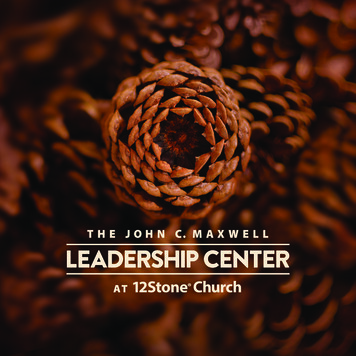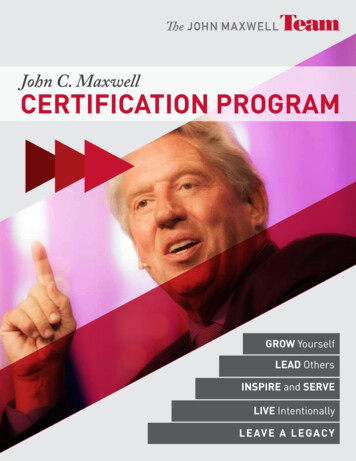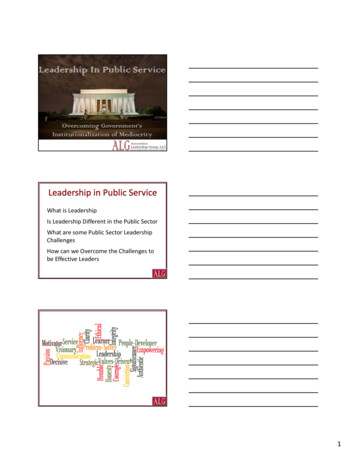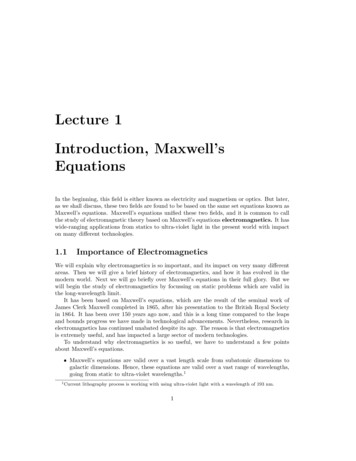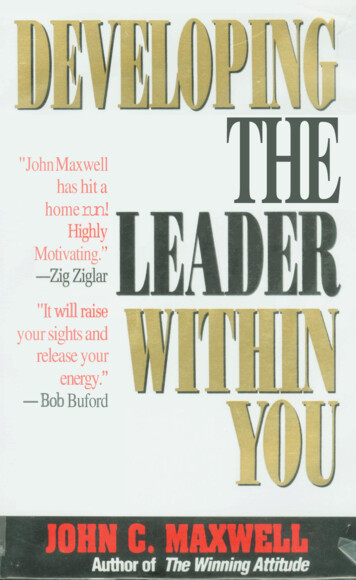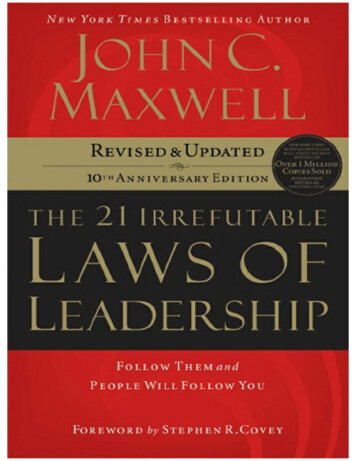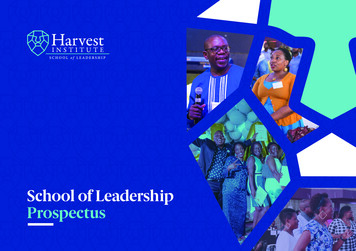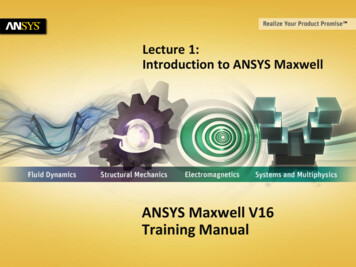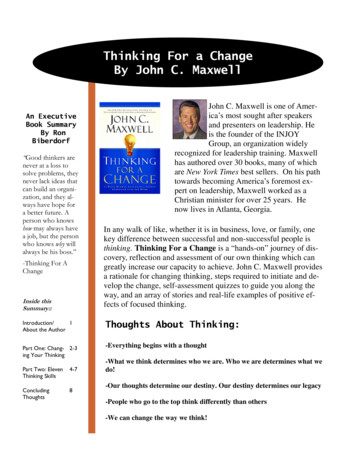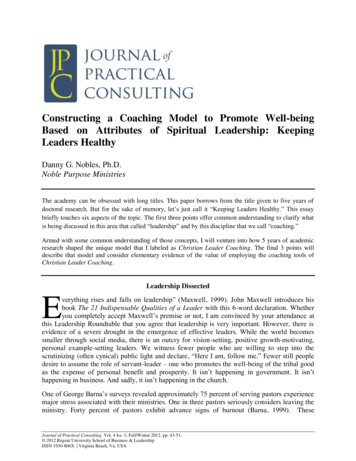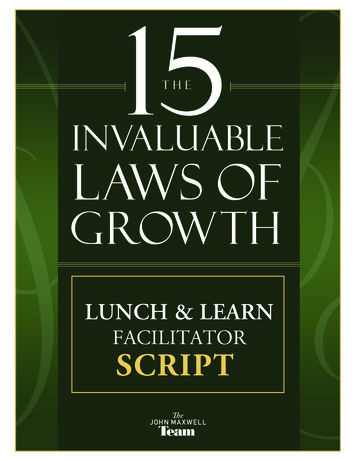
Transcription
INTRODUCTION & WELCOMEGood afternoon everyone. Thank you (name of the person introducing you)for that great introduction. Again, my name is (NAME) and it’s my privilegeto spend the next (30-45 minutes, whatever time you’ve been allotted) withyou speaking on a topic that has changed my life which is why I am sopassionate about it the topic of personal growth. Each one of you inthis room.is unique. Would you all agree with me about that? Show ofhands agreeing with me that each one of you is unique there we go (lookaround the room) hands are up all over the room. That’s great. Nowanother show of hands, how many of you believe you have reached yourfull potential in your life or business?(look around the room again)Wow did you see that? No one, not a single one of you, raised theirhand. Why? Because we all believe we have room to grow. I know I haveroom to grow. Do you want to be a better person tomorrow than you aretoday? Growing yourself daily guarantees that you will be better than youwere the day before.Now before we dive into personal growth and making ourselves better.(30-45 minutes, whatever time you’ve been allotted) is not enough time forus to do a deep dive into all the facets of personal development. I did aGoogle search just on the phrase “personal growth”. Guess how manyentries Google came up with for “personal growth”? There were over 44.5-1-
MILLION that’s right 44.5 MILLION entries just on “personal growth”.So, I want to be clear with you, up front, from the very start, we will notcover everything there is to know about personal growth in this sessiontogether. Fair enough?With that many entries on the topic of personal growth, I think the bestway for us to begin is by going straight to the top of the personal growthguru charts. Wouldn’t you agree? One of my mentors happens to be at thetop of this list. He has written several New York Times Best-selling bookson leadership and personal growth. In fact, he has written more than 100books and sold more than 26 million copies. His name is Dr. John C.Maxwell. His book the 15 Invaluable Laws of Growth, is one of those NewYork Times best sellers and is an outstanding must-have resource that Irecommend you add to your library for reaching your full potential.We will spend the rest of our time together (approximately 20-30 minutes)exploring two of John’s 15 Invaluable Laws of Growth. The two laws thatwe will cover are: The Law of Pain and the Law of the Rubber Band. Thesetwo laws are important aspects for your personal growth because the Lawof Pain tells us that we will all experience “growing pains”; life lessonsrequiring some form of pain management. How we handle these painfulmoments affect our growth. In the Law of the Rubber Band, in order foryou to grow to your full potential, you have to stretch beyond your current-2-
comfort zone. Stretching grows your athletic muscles and your personalgrowth muscles.Are you ready to go and grow? Let’s begin with THE LAW OF PAIN - INTROThe Law of Pain says that the good management of bad experiences leadsto great growth and is necessary to grow. This law is a tough to pill toswallow because pain is something we naturally avoid. But this law isabout teaching you and I how to turn our bad experiences into positivesteps leading to our success.Now we all have them, and let me guess, no one likes them, right? [Pause].Let’s do a little experiment. Raise your hand if you LOVE bad experiences.[Likely no one]. I’m shocked! No one in this room like bad experiences?Really?Okay, now raise your hands if you LIKE bad experiences them [Pause,Likely no one again]. Hmmm. Interesting how that works. No one lovesthen or even likes them.-3-
[In a playful way] Okay, how about if you maybe, kinda, sorta, wouldn’tmind a bad experience or two? [Pause, some will possibly raise a hand andthis is a good time to be playful and witty. Be a little playful with theaudience members who raised their hands about how they are gluttons forpunishment or something along those lines].LEARN ITJohn quotes John McDonnell in his chapter on the Law of Pain, saying,“Every problem introduces a person to himself.” [repeat that quote asecond time].The bottom line with this law is that everyone has bad experiences. Wecan’t avoid them. Some of us run from them some do whatever little bitthey can to deal with them, and others embrace them. No matter what, stillwe can’t avoid them.The last in that group, those who embrace, are the people theleaders who choose to learn from difficult and very challengingexperiences. I remember the first time I spoke at an event for a colleagueof mine. I had planned everything out and had rehearsed - what I thoughtwas enough - but, once I started talking I went blank. I felt the humiliation-4-
rising within me and I wasn't quite sure what to do. I could tell the peoplein the audience sensed my hesitation to continue. It was a very painfulsituation to be in. My voice started trembling and I felt as if my whole bodywas shaking. Have you ever experienced that? (pause)Fortunately, I remembered and switched to a story that I knew well. After Itold the story, I was able to get back on track and finish the speech. Fromthat point on, if I thought I had rehearsed enough - I rehearsed more!We all have bad experiences. You’ve heard the saying that “life is filledwith ups and downs.” The problem is most of us just want “Ups and ups!”We do everything in our power to avoid bad situations, yet they will alwaysfind us. It’s hard taking it “one day at a time,” when you feel like “the day”just attacked you all at once.And it’s true that no one likes bad experiences. Look at how many of youraised your hand when I asked you if you loved bad experiences! But ifyou learn to manage your bad experiences well, then you get somethinggood out of them - plus you have great “war stories” to tell.So many people take the ‘should have, would have, or could have’ pathwhen dealing with bad experiences.-5-
Consider some of the types of pain we face. The Pain of Incompetence: “ISHOULD have seen that coming.” The Pain of Financial Loss: “If I COULDonly get that back.” The Pain of Not Being Number One: “I WOULD be atthe top if it wasn’t for .” The Pain of Change” “They don’t knowwhat they’re doing, they SHOULD have listened to me.” And so on.We know that very few people, quite honestly, can take positiveexperiences from bad experiences. Many people become bitter fromhaving bad experiences over and over. Few people become better. I wantto help you find ways to become better.LIVE ITWhat I’ve just shared with you are a few examples of what John calls yourPain Files; the Pain of Incompetence, the Pain of Not Being Number One,and so on. But just because we have our pains in files like these, doesn’tmean we should ignore them. We keep files so we can remember andgrow from experiences such as these to look back on to refer to. Weneed to turn our pains into gains.We do this by choosing a Positive Life Stance. By this I mean we need tolook for the positive lessons in every experience. There is always-6-
something positive but you may not see it at the time of the experience.When you live your life with a positive life stance, you find that the goodwill become better and the bad will not be as bad as it seemed in themoment.One way is to embrace and develop our creativity. Neale Donald Walshsays, “Life begins at the end of your comfort zone.” Use the gift of a badexperience to open your mind and challenge yourself to use your ownbrilliant creativity.Embrace the value of your bad experiences. You have a choice. You canlook at your bad life experiences and be set back from them, or learn fromthem. Its’ been said that in life there are winners and there are losers.Aside of the final score in a sporting event, I would say, for leaders, thereare winners and there are learners.One of the biggest pushes we get going forward from bad experiences ismaking good changes after learning from bad experiences. A bend in theroad is not the end of the road unless you forget to make the turn. Whathappens to us is rarely the end of the road. However, many of us focus onour feelings about what has happened to us rather than focus on ourthoughts and actions that will lead us in a better direction.-7-
The next time you are faced with a bad experience, remind yourself thatyou are on the cusp of change. Check your emotions and use them to bea catalyst for change and growth, not for them to paralyze you.LEAD ITNow let me give just one more thing to think about related to the Law ofPain directly connected to leadership. In other words, how do we leadfrom the Law of Pain and how do you apply this law specifically to yourlife?So, let’s look at that applying this law specifically to your life. There areseveral questions you can explore, but in this limited time let me give youa few to think about.How do you deal with pain? Do you do anything and everything possibleto avoid pain at all? Or do you endure it since you know you have to getthrough it some way or another? Or do you work to embrace it and remainpositive despite having bad experiences? We all know people that do anyand all of these, right?-8-
Thinking about where you are on the spectrum of how you view badexperiences can guide you in taking great advantage of growing from suchpain. We know that getting an understanding of what has happened andrecognizing the emotions you have because of these experiences, is thestart to creating a positive action going forward. There can be numerouspathways going forward. Here are a few things you can do:Get input from others, [slight pause]Understand your emotions, [slight pause]Identify a specific desired change you want to have, [slight pause]Think about what positive change you can influence; either in yourselfand/or in others.Above all, remember that personal growth requires action. If you haven’tbeen ACTING when a bad experience happens, then you’re simplyavoiding.Personal growth requires action. It’s as simple, and as difficult, as that.Don’t let another painful experience go by without learning and growingfrom it.-9-
THE LAW OF THE RUBBER BANDNow let’s look at another one of my favorite laws of growth: The Law ofthe Rubber BandINTRODUCTIONThe thesis for this law is: “Growth Stops When You Lose the TensionBetween Where You Are and Where You Could Be”If I were to ask the question: “Do you want to grow?” How would YOUrespond? I believe it would be a resounding yes, I want to grow! But thetruth of the matter is that for most of us, we avoid any form of pressurebecause we don’t want to feel uncomfortable. You see, we have beentaught that comfort is a place to be desired and strived for.May Iintroduce a new thought? Okay here goes All living things grow andthat growth requires stretching. John says: “True life begins at the end ofour comfort zone and we arrive there by stretching.”Ice Breaker: (Have a bag of rubber bands handy and make sureparticipants have paper/pen)I would like to give all of you a rubber band and I want you to take 2minutes to write down all the ways that the rubber band can be used.- 10 -
Okay thank you very much for doing the exercise! Now someone pleasetell me of all the things you wrote on your list, what do they all have incommon concerning the use of the rubber band? (ask for audienceinput and facilitate that)Please let me clarify!Rubber bands are ONLY useful when they arestretched.You would not be where you are and who you are today without someform of tension or stretching taking place. For many, the thought is, whenI graduate from high school or college, I have arrived and I can now stopbeing stretched. I mean after all, I am grown now, right? I think "the truthis that we should continue growing throughout our lives”. But with growthcomes discomfort and initially pain.What we felt in school was, thetension to do enough to get that diploma. It can easily be described as,the tension between where you were and where you wanted to be couldn’t it? So, what did you do? You did just enough to get by right?Perhaps some of you are like me, all I wanted to do was get out of schoolbecause my thought was, once I get out of school I will not have to feel allthis pressure. I mean after all, where and when will I use all this stuffanyway?- 11 -
One of my favorite quotes of all time is: “God’s gift to us is potential andour gift to God is developing it.” So how do we do that? It’s quite simple;by getting out of our comfort zone. By continually stretching, not onlyphysically but emotionally, intellectually, and even spiritually.John gives us seven benefits to tension that I would like to share with you.Now, Time does not permit us to explore these benefits at length. Here’s aquick overview:POINTS TO MAKE1. Few people ever want to be stretched – it is literally like saying toyour employer, I know I am over qualified but I promise to only usehalf of my ability. Most people use only a fraction of their ability andrarely if ever try to reach their full potential. David Godine claims thatonly 32% of the US population has ever been in a bookstore. Why isthis statistic so alarming? Because we are not willing to read, tolearn, and grow. When was the last time you learned something newfor the first time?2. Settling for the status-quo – Most people are satisfied to settle intothe comfortzone of life falling into familiar patterns and habits they have learnedfrom those around them. Being in the comfort zone may feel good- 12 -
and feel safe but it will lead to mediocrity and ultimatelydissatisfaction. It takes real courage to push yourself outside of yourcomfort zone. No one remembers average people.3. Stretching is an inside job - The real process of growth begins withyour thoughts. Those thoughts then become words and the wordsbecome actions! James Allen says: “You cannot travel within andstand still without.” Think about it! All life, except mankind, grows toits full potential. It’s only mankind that circumvents the process. Forexample: How tall will a tree grow? A tree doesn’t decide to stopgrowing, it continues growing all its life. This inside job is an internalmeasurement that allows you to evaluate where you are against whatyou are capable of.4. Stretching always requires change – change is always a challengebecause it propels us out of a place of comfort. Just a couple of realtruths I would like to share with you. You can’t improve and avoidchange at the same time! We must stop looking over our shoulder atwhat was and start focusing on what is. I find it interesting that youusually will not find a successful person who isn’t restless in someway. And to quote George Elliot, “It is never too late to be what youmight have been.” If you are still satisfied with what you did fiveyears ago, then you are not growing.- 13 -
5. Stretching sets you apart from others – have you noticed thatpeople seem to have become satisfied with mediocrity?This isabout a personal concession to be less than your best. I find it sointeresting that excellence seems to be further and further away fromthe accepted norms of society. Successful people set themselvesapart from the crowd by going over and above what others do. Asyou stretch and get better you will be able to affect and infect otherswho will follow your lead and everyone will become better as aresult.6. Stretching can become a lifestyle – When you stop stretching youstop growing and perhaps even stop in some ways. I for one amgoing to continue stretching and growing as long as I’m on theplanet. There is no place for me personally to stop and rest on mylaurels because all living things continue growing and it onlyhappens by being stretched. Make stretching yourself a dailyroutine.7. Stretching gives you a shot at significance - You see, if you aregoing to grow yourself you must first know yourself. What is the gapbetween good and great? Could it be that our ability to close thatgap is directly related to our willingness to be stretched? Who are- 14 -
you having a positive impact on today? Who is it that you haveintentionally invested in today that is making a difference in themand you?John has said: “I want to make a difference, doing something that makes adifference, at a time that makes a difference, with people who make adifference.” People who are committed to stretching themselves will makea difference.The real bottom line on the Law of the Rubber Band is are you alwayslooking for a better way to do what you already do? If you are, then youneed to know ahead of time that it will stretch you out of your comfortzone and propel you into your desired future.The Law of the Rubber Band may be my favorite law because as I live itout, I am never the same and I get better.CLOSE“As you deal with your day to day situations, whether business or personalrelated, you are going to have several painful experiences. How youchoose to deal with those determine how you positively (or negatively)impact your circumstances and influence those around you. What I amsaying is: when life gives you lemons, remember the tension of the rubberband and use those lemons to make lemonade.- 15 -
[Allow time in L & L for Pitch for the Next Step (1:00).] This is thespeaker’s personal pitch for other program and services she/he can offerto the audience or organization (if a single entity).Below is an example of what a personal pitch looks likeWe’ve briefly touched on two of John’s 15 Invaluable Laws of Growth.Imagine doing a deeper dive into these Laws in a group setting. Whatwould happen to you if you and your organization took a deeper dive intothese Laws? What would that do for your personal growth? What I wouldlike for you to do as we close is simply fill out this one question surveyform that asks:“Would you find studying the type of material presented here today wouldhelp you and the company achieve better results?” Yes or No.Simply circle your answer and return your survey to me, please.I hope this session added value to you today.Thank you for yourattentiveness and thank you (Your host) for having me here today. It’sbeen an honor being with you today. My name is , a coach, speakerand trainer with the John Maxwell Team. Have a fantastic rest of your day.- 16 -
Alternate ending:And I’ll close with this, you see, it has been an honor and a privilege to behere with you today and as I told you at the beginning, personal growthand development has really made a difference in my life and honestly I ama personal growth junkie because of it. I mean, I’m a real junkie. I lovepersonal growth and development. And I think that you will be too onceyou've started seeing a difference by applying what I have shared with youhere today. Thank you again and I look forward to working with you.- 17 -
books and sold more than 26 million copies. His name is Dr. John C. Maxwell. His book the 15 Invaluable Laws of Growth, is one of those New York Times best sellers and is an outstanding must-have resource that I recommend
